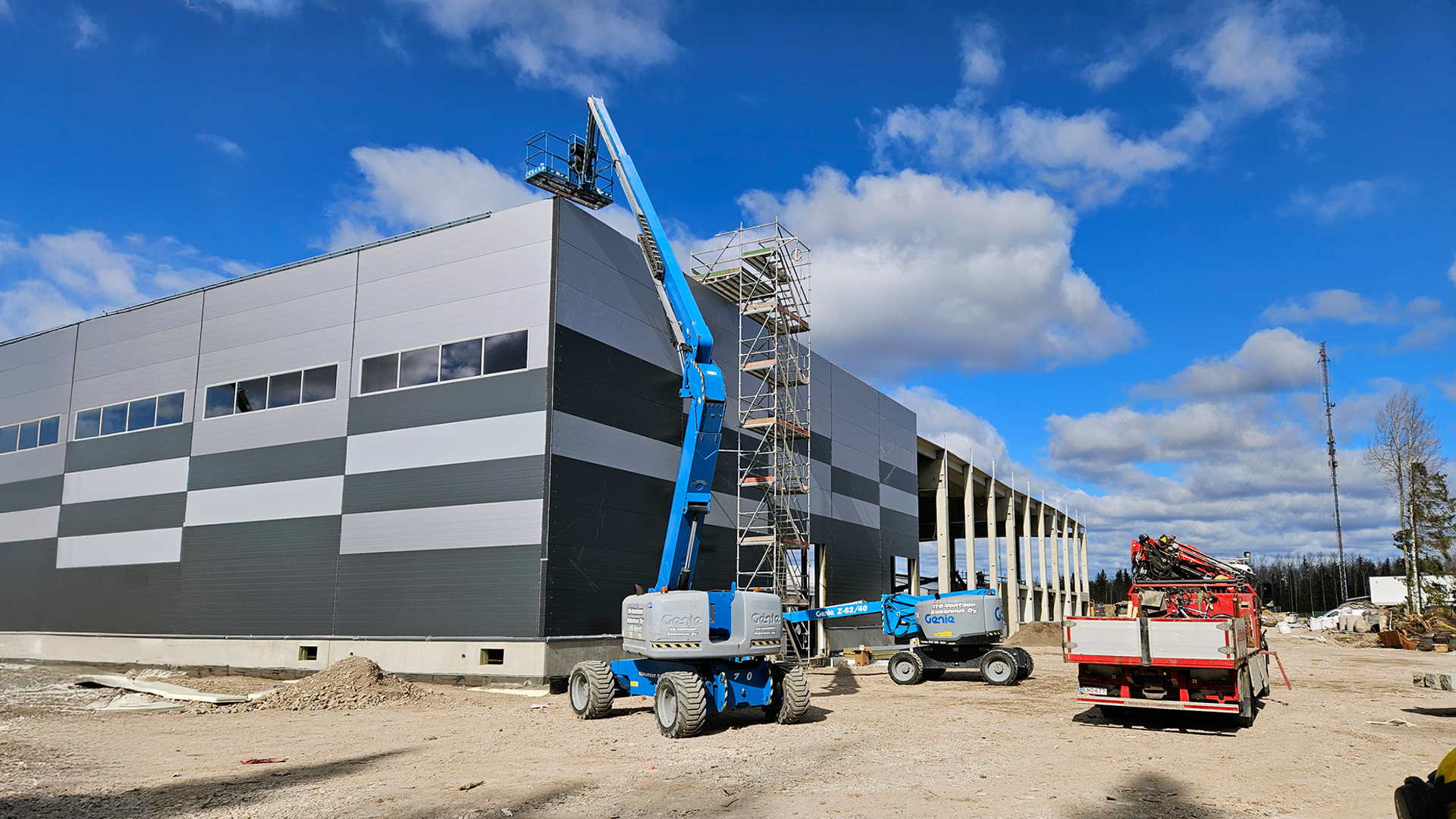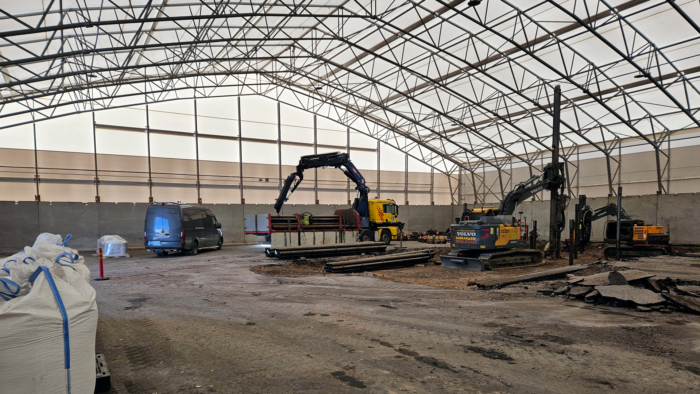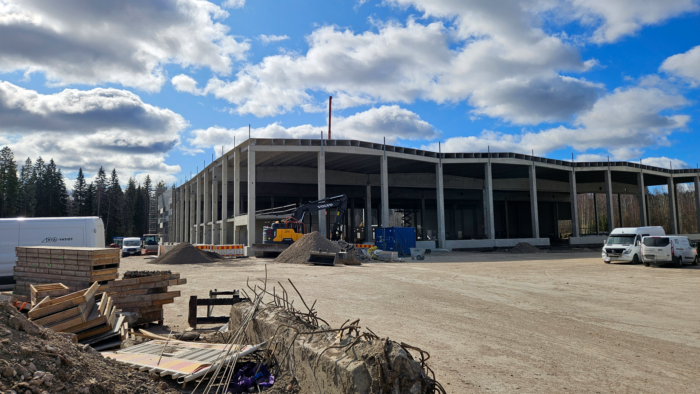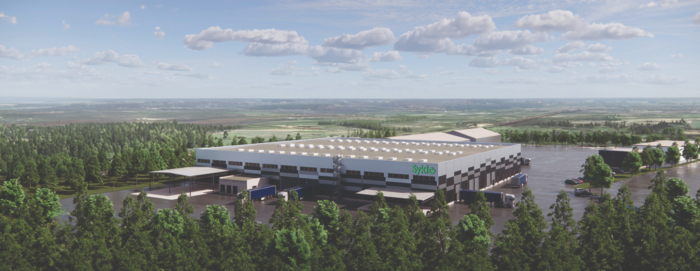
A new plastics recycling centre is rising in Hyvinkää – the circular economy will be integrated from the very foundations of the facility
Circular economy company Syklo is currently constructing a next-generation plastics recycling plant in the Sahamäki industrial area, with its foundational structures built using recycled concrete, in line with Syklo’s commitment to circular economy principles. The scale and impact of the project are unparalleled in the Finnish context.
Less than a year ago, the Sahamäki area consisted only of a cold metal-clad hall, a PVC hall, and some office space. These spaces are now being transformed into an operational hub for an international-scale plastics recycling plant, a biocomposite production line, and a dedicated testing environment.
The largest single undertaking is the production hall of approximately 9,500 square metres, which will accommodate advanced sorting and washing lines for film and hard plastics, along with the production of Sykloplast recycled plastic pellets.
“We rarely see such large investments in the recycling industry in Finland. You could say that this project matches the combined scale of all other plastics recycling plants in Finland,” states project director Petteri Asikainen.
The circular economy is evident in sustainable choices even during construction
Syklo doesn’t just talk about the circular economy – it puts it into practice. The plant’s water system operates in a fully closed loop, preventing micro- and nanoplastics, as well as other contaminants, from entering the environment. The solution requires an additional million-euro investment, but it was deemed essential from a sustainability perspective.
Asikainen shares that Syklo has also aimed to reflect its circular economy principles in the construction process. Syklo has recovered old concrete waste in soil and foundation structures, for example.
“The recovery and utilisation of recycled materials and the circular economy are central to Syklo’s operations, beginning from the very first shovel in the ground,” states Asikainen.

The exceptional project is progressing on schedule
Construction at the site, which started in September 2024, has progressed from earthworks and piling to the erection of the hall’s structural frame. Next up is the construction of the roof.
At the end of April, concrete floors will be cast in the hall and equipment installation will begin, with a little over six months allotted for the work.
“In the coming weeks, the number of workers on site will increase to around fifty, with approximately a dozen different subcontractors involved. This is also a big project from the point of view of employment,” Asikainen says.
Parking spaces will be constructed later in the spring for the new employees joining Syklo’s plastics recycling plant.
Technologically advanced production facility
The plant will process up to 50,000 tonnes of waste plastic raw material per year – a capacity equivalent to that of all existing recycling plants in the rest of Finland combined. This is made possible by the innovative technology of Syklo’s partner, Impact Recycling, which integrates sorting, washing, and final production into a single streamlined process within one space.
“Traditional plastics sorting requires multiple NIR sorting machines in sequence to achieve the necessary level of sorting accuracy. With Impact Recycling’s technology, the same level of sorting accuracy can be achieved in a single sorting step. It saves a considerable amount of space, energy, and money,” says Asikainen.

Actions for a better future
Recycling at the Sahamäki site in Hyvinkää is nothing new, as the area has been home to environmental and recycled material sector activities for the past 15 years. Previous activities in the area have included, among other things, the processing of recycled wood, the storage of demolition and construction waste, and treatment operations for energy waste and scrap metal.
With the construction project, the area will gain a strong sense of continuity as the international plastics recycling plant begins operations in summer 2026.
“From a regional perspective, Hyvinkää is also logistically an ideal location for a circular economy hub, with major cities and the port area in close proximity. There are also several other plastics processors and collection infrastructure in the area, which makes the availability of raw materials look promising,” states Asikainen.
The plastics recycling plant being built by Syklo exemplifies how sustainable operations and the circular economy don’t happen on their own, but are built step by step through collaboration and determined action.
3 reasons why Syklo’s project is exceptional
1. Unparalleled in the Finnish context
The annual capacity of the new plant – up to 50,000 tonnes of plastic – is equivalent to the entire existing plastics recycling infrastructure in the rest of the country combined.
2. Circular economy from the start
Recycled demolition concrete is recovered for use in construction, process water is treated within a closed-loop system, and microplastics are prevented from entering the environment.
3. Smarter technology, less space
The modern process integrates sorting, washing, and pellet production into a single streamlined production line, requiring less space and delivering enhanced cost-effectiveness.

